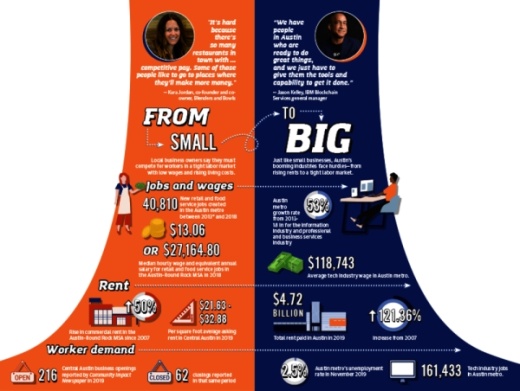Commercial rent in the Austin-Round Rock Metropolitan Statistical Area has increased 50% since 2007, per commercial real estate information company CoStar.
“Rent is always ... on our minds,” said Cody Taylor, owner of West Sixth Street restaurant Cafe Josie.
With worsening traffic and scarce parking downtown—and new development in areas such as the Domain and East Austin—diners can go elsewhere, Taylor said.
To stay relevant, Cafe Josie transitioned from a traditional menu to a tasting format and reintroduced lunch service.
“We use it more as motivation,” Taylor said of the city’s growth.
The changes have been successful: In 2019, Cafe Josie saw its third year of record profits, Taylor said.
The city’s tight labor market has similarly tested small businesses.
While the number of workers in the food service and retail industries has grown with Austin’s population, so, too, have the employers.
While not comprehensive, •Community Impact Newspaper• reported 62 Central Austin business closures—and more three times as many openings—in 2019.
Staffing is a consistent challenge for Kara Jordan and Erin Downing, who opened acai food truck Blenders and Bowls in 2010. The business quickly grew into a cafe space at a downtown yoga studio and now has four stand-alone locations.
“It’s hard because there’s so many restaurants in town with ... competitive pay,” Jordan said. “Some of those people like to go to places where they’ll make more money.”
Doug Guller, CEO of local hospitality company ATX Brands, said he is focusing on company culture to retain employees—and keeping staff small.
At the recently opened third location of chicken tenders chain Happy Chicks, Guller staffs two workers front of house and two in the back.
“We’ve tried to take from what is happening in the market and adjust,” he said. “But ... overall it’s getting tougher and tougher to be a traditional restaurant in the market.”
To supplement traditional business models, small-business owners are seeking new revenue streams.
Demand for catering service is up as professional service companies try to keep their employees happy amid low unemployment, Guller said, and accounts for a growing portion of Happy Chicks’ revenue.
Third-party delivery services, such as Favor and Uber Eats, help reach more customers—but Guller said he is negotiating more favorable terms with the companies, which charge as much as 30% per order.
Blenders and Bowls has paused opening new stores—”build-out costs are astronomical,” Jordan said—and is maximizing the space it has.
One location has more square footage than the rest, so the pair built a commissary kitchen where they prepare catering orders and a new product line.
But not every business can withstand the city’s changes.
Miguel Martin announced in November that his Burnet Road import pottery business Miguel’s Gallery & Garden will close this summer after 26 years.
While staffing has always been a challenge—employees move pots weighing up to 300 pounds in the summer heat—Martin decided to close after selling his property to a developer. It will become an office park.
“I would have stayed in business until I was 65,” the 58-year-old said.
Despite the challenges, many business owners—including Martin—relish the chance to work in Austin.
“I give credit to the Austinites because they really like the homegrown feel,” Downing said. “I want to keep it that way, too.”




